~ 19 ~
“HE LOVED THEM TO THE END” ~
“Then he poured water into a basin and began to wash the disciples’ feet.”
I prepare my heart for prayer
As I begin, I take a moment to become aware of the Lord present to me,
looking upon me with love, desiring to speak to my heart.
Prayerfully, I read John 13:1-17
After prayerfully reading, I ask for a grace I desire in this time of prayer.
Using my reasoning:
• Think about what is happening in the scene; what are the action words?
• Who are the people in the scene? What is the place? What things are described?
• What words catch my attention? What does this mean to me?
Using my imagination:
• Imagining myself in the scene – am I an observer or participant? To whom am I drawn?
• Using all of my senses – what do I see? What do I hear? What do I feel, smell or taste?
Reflect on what God is saying to my heart:
• As I reflect, I use my spiritual senses to acknowledge what is transpiring in my heart – my thoughts, feelings and desires. (Acknowledge means to see, to notice, to become aware of, to name.) This is important to do, as my thoughts, feelings and desires shape my actions.
• I look for the truth the Lord is communicating to me. I ask Jesus to give me his mind and his thoughts to see with the eyes of his heart what he wants to reveal to me today. How is Jesus calling me to apply this truth to my life?
Guided Reflection
Quoted from “An Ignatian Introduction to Prayer,”
by Father Timothy M Gallagher, O.M.V1
Jesus’ hour has come … It is the Passover. I see him at supper with the twelve: the upper room, the food for the meal, the wine …
My gaze centers now on Jesus, in this moment of his self-giving … “Having loved his own who were in the world, he loved them to the end.” “His own.” I thank him that he has called me to be “his own.” And I ponder this love, given to the end: to the utmost degree, to the last moment of his life … given for “his own,” for me …
Now, as I watch, Jesus expresses the whole meaning of his life of service, a life lived in “the form of a slave” (Phil 2:7), with a symbolic gesture, filled with meaning …
I see him rise from the table, gird himself with a towel, take a basin with water, kneel at the feet of one disciple, then another, then another … and wash their feet … Can I allow him to wash my feet …?
I see Peter resist — he struggles to allow the Lord to kneel before him, to serve him so humbly, to love him in this way … I, too, know this struggle …
“Lord, do you wash my feet?” “What I am doing you do not know now, but afterward you will understand.” How often I, too, do not “know now” what the Lord is doing in my life … but later I understand …
“You shall never wash my feet.” “If I do not wash you, you have no part in me.” “Lord, not my feet only but also my hands and my head.” Peter allows the Lord to love and serve him … I open my own heart to that love … and no longer resist …
Now I see Jesus take his place again at table … I hear him ask me: “Do you know what I have done to you?” Do I know? I answer him …
“If I then, your Lord and Teacher, have washed your feet, you also ought to wash one another’s feet. For I have given you an example …”
I ask the Lord to understand, deep in my heart, his example of service, his love for his own to the end. I share the gratitude for that love which rises in my heart … I speak to him now, at length, with profound attention, unhurriedly, from my heart …
I ask his grace to love those he has given me to be “my own” with the same love of service … to the end …
I ask for this grace in this time of prayer:
Converse with God2
Acknowledge:
• What are the thoughts arising in my heart? I think …
• What are the feelings arising in my heart? I feel …
• What are the desires arising in my heart? I desire …
Relate:
I honestly relate these to God; I talk to him about them, trusting he is present and listening to me, his beloved child.
Receive:
• I listen to what the Lord wants to say to my heart, knowing his love is gratuitous and unconditional. I receive his love and consolation. I trust he longs to console me, to encourage me, to strengthen me, to heal me, to forgive me …
• I allow him to lead me; perhaps returning to the scripture …
Respond:
• I conclude my prayer time speaking to Jesus, God the Father, and/or the Holy Spirit as I would speak to a friend. I may also invoke the intercession of Mary and the Saints.
(St. Ignatius calls this a colloquy.)
Praise him – give glory to God for who he is; for being all good and loving; for being my Lord and savior …
Thank him – for our time together; for his word to me; for the gifts he has given me today …
Ask him – for his help, grace, strength, wisdom, deeper faith …
• Based on what God is saying to my heart, I resolve to act in the following concrete way to love God and love neighbor (which could be something small). Today I will …
Rest in the Lord: Be still and know that I am God
Psalm 46:10
1 Gallagher, T., 2008. An Ignatian Introduction To Prayer: Scriptural Reflections According To The Spiritual Exercises. New York: The Crossroad Publishing Company.
2 This way to converse with God in prayer often called ARRR is taught by The Institute for Priestly Formation out of Omaha Nebraska. For more information see Father Traynor, Scott (2013) The Parish as a School of Prayer and Dwyer, Karen and Lawrence (2011) WRAP Yourself in Scripture (IPF Publications).





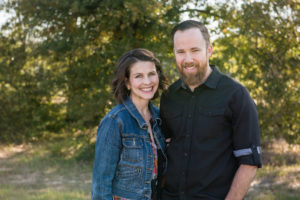


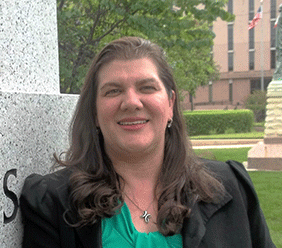
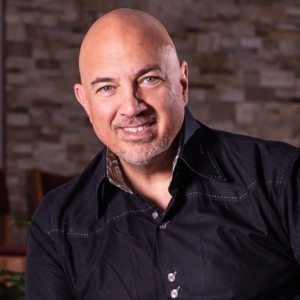
 Kimberly Kay Cox
Kimberly Kay Cox
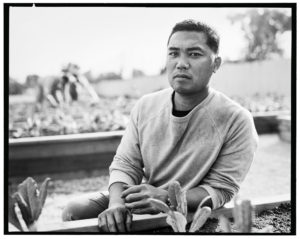






 Mark Mogilka
Mark Mogilka














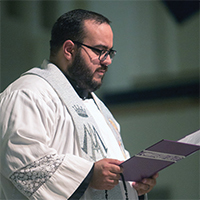



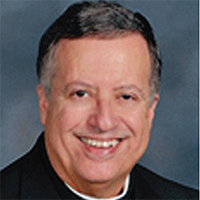

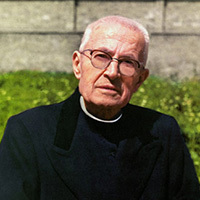







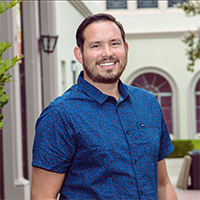
 Armando Cervantes
Armando Cervantes Anna Betancourt
Anna Betancourt
 Andrea Chavez-Kopp
Andrea Chavez-Kopp